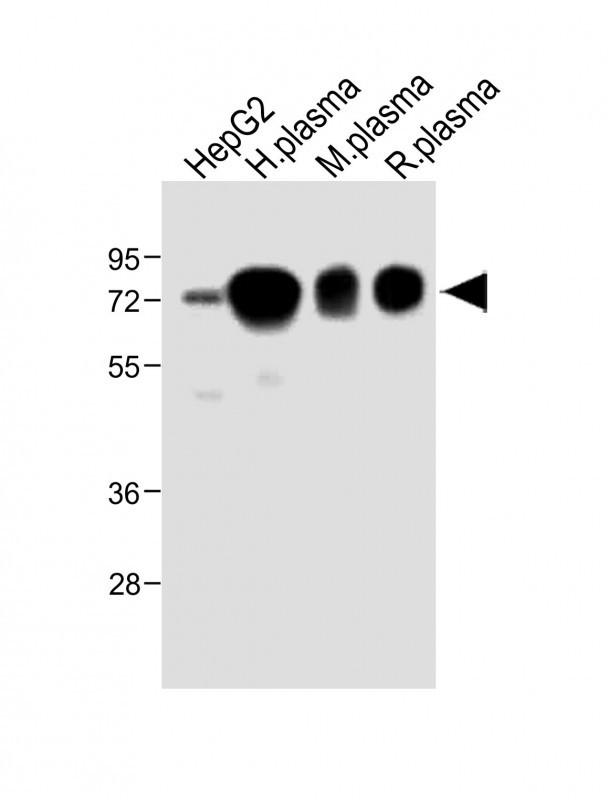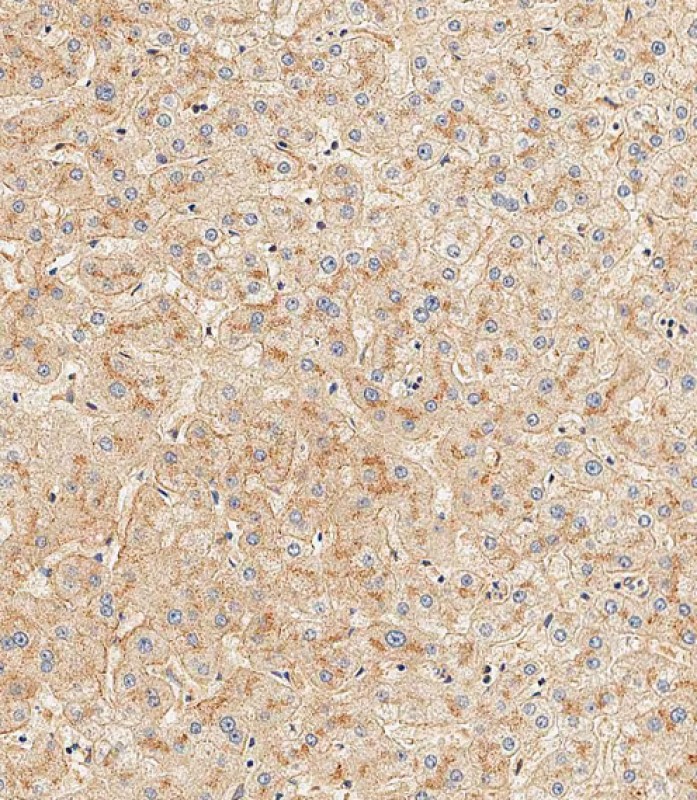

| WB | 咨询技术 | Human,Mouse,Rat |
| IF | 咨询技术 | Human,Mouse,Rat |
| IHC | 1/500 | Human,Mouse,Rat |
| ICC | 技术咨询 | Human,Mouse,Rat |
| FCM | 咨询技术 | Human,Mouse,Rat |
| Elisa | 咨询技术 | Human,Mouse,Rat |
| Aliases | Hemopexin, Beta-1B-glycoprotein, HPX |
| Entrez GeneID | 3263 |
| WB Predicted band size | 51.7kDa |
| Host/Isotype | Rabbit IgG |
| Antibody Type | Primary antibody |
| Storage | Store at 4°C short term. Aliquot and store at -20°C long term. Avoid freeze/thaw cycles. |
| Species Reactivity | Human, Mouse, Rat |
| Immunogen | This HPX antibody is generated from rabbits immunized with a KLH conjugated synthetic peptide between 200-227 amino acids from the Central region of human HPX. |
| Formulation | Purified antibody in PBS with 0.05% sodium azide,1%BSA and 50% glycerol.prepared by Saturated Ammonium Sulfate (SAS) . |
+ +
以下是关于HPX(Hemopexin)抗体的3篇代表性文献示例及其摘要内容:
1. **文献名称**:*Hemopexin as a Potential Biomarker for Hemolytic Anemias: Development of a Novel Monoclonal Antibody-Based ELISA*
**作者**:A. Smith et al.
**摘要**:本研究开发了一种针对人源HPX蛋白的高特异性单克隆抗体,并基于此建立了ELISA检测方法。实验验证了该抗体在检测血清HPX水平中的灵敏度和特异性,发现其在溶血性贫血患者中显著升高,提示其作为临床诊断工具的潜力。
2. **文献名称**:*Structural Characterization of Hemopexin and Its Interaction with Heme Using Polyclonal Antibodies*
**作者**:J. Li & R. Tanaka
**摘要**:通过制备兔源多克隆HPX抗体,作者解析了HPX蛋白与血红素结合的分子机制。抗体被用于免疫沉淀和免疫印迹实验,揭示了HPX在不同组织中的分布差异及其在抗氧化应激中的关键作用。
3. **文献名称**:*Targeting Hemopexin in Cancer Therapy: A Humanized Antibody Approach*
**作者**:M. Garcia et al.
**摘要**:研究团队开发了一种人源化HPX抗体,用于靶向肿瘤微环境中过表达的HPX蛋白。体外和小鼠模型实验显示,该抗体能有效抑制肿瘤细胞迁移并增强化疗药物敏感性,为癌症治疗提供了新策略。
---
**注**:以上文献信息为示例,实际研究中需根据具体需求检索真实发表的论文。建议通过PubMed或Web of Science等数据库,以关键词“Hemopexin antibody”或“HPX immunoassay”查找最新研究。
The hemopexin (HPX) antibody is a tool used to study hemopexin, a plasma glycoprotein critical for heme homeostasis. Hemopexin, primarily synthesized in the liver, binds free heme (iron-containing porphyrin) with high affinity, preventing heme-induced oxidative damage and facilitating its transport to the liver for degradation and iron recycling. This protein plays a vital role in mitigating the toxic effects of extracellular heme released during hemolysis, inflammation, or tissue injury.
HPX antibodies are widely employed in research and diagnostics to detect hemopexin levels in biological samples, aiding in studies of conditions like hemolytic disorders, sepsis, neurodegenerative diseases (e.g., Alzheimer’s), and hemolytic anemias. They are used in techniques such as ELISA, Western blotting, and immunohistochemistry to explore HPX’s interaction with heme, its regulatory mechanisms, and its role in cellular protection.
Recent studies highlight HPX as a potential therapeutic target or biomarker, particularly in diseases involving heme overload or oxidative stress. The antibody’s specificity ensures accurate measurement of HPX in clinical settings, supporting investigations into its protective functions and therapeutic applications. Understanding HPX dynamics through antibody-based assays continues to advance insights into heme metabolism and related pathologies.
×